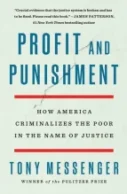Profit and Punishment: How America Criminalizes the Poor in the Name of Justice

Author: Tony Messenger
Publisher: Griffin Books, 2024. 272 pages.
Reviewer: Christine Scott-Hayward | April 2024
In Profit and Punishment, Tony Messenger highlights the inequities of local criminal legal systems that rely on court fees to fund themselves. The book builds on a series of columns for which Messenger won the Pulitzer Prize in 2019 and centers on the stories of three women whose lives are upended by convictions for low-level offenses: petty theft (for the theft of a $8.74 tube of mascara), possession of drug paraphernalia and possession of marijuana (because of police finding a pipe with traces of marijuana) and assault (after a fight with a roommate). Focusing on the state of Missouri, Messenger uses these stories and others to describe a broken system that repeatedly punishes people experiencing poverty and to tell the story of the legal and legislative efforts to effect change.
The book begins by describing the arrests and court processes that lead to these and other misdemeanor convictions and the litany of fees that precede and follow them. For example, two defendants are asked to pay a $40 fee to request a public defender, even though the Constitution guarantees indigent defendants the right to counsel even if they cannot afford an attorney. One explained that she could not afford the $40 fee, and the judge waived the fee; the other was not told waiver was an option, gave up her right to counsel, and was quickly found guilty in a case where she likely had a strong self-defense claim.
After conviction, the costs mount. One defendant was given a deferred jail sentence and community service and was ordered to pay court costs, which totaled $1,150. Some of these costs make no sense and are unrelated to the court system; Messenger highlights a $3 fee to fund an additional retirement benefit for sheriffs, which resulted in poor residents of cities funding the retirement of sheriffs in rural counties. Although a small amount, when added to the other fees imposed, the costs add up. He convincingly argues that the movement away from funding courts and police departments with state and local taxes that are broadly applied to court fines and fees disproportionately burdens poor people and people of color.
Of course, many cannot afford to pay these fees, and, particularly in cases where payment of fees is listed as a condition of probation, they end up in jail. The irony for counties is that the cost to house people in jail for failure-to-pay charges can be a lot more than is brought in by the fines and fees themselves. (p.52) But more worrying is the fact that debtors’ prisons are not supposed to exist in the United States. It is unconstitutional to incarcerate someone for failure to pay fees if they genuinely cannot afford to pay those fees. Yet Messenger cites numerous examples of judges failing to follow the law, and courts frequently fail to hold ability to pay hearings, so many people spend time in jail simply for being poor.
But the problems don’t end here. In the book’s next section, Messenger turns to the jails themselves. He highlights several important issues, including many counties’ “pay-to-stay” system. In Missouri, counties charge people a daily fee for their stays even if they have been detained pending trial, i.e., because they cannot afford to pay the bail set in their case. One woman was charged $1,400 for a jail stay resulting from her inability to pay the $3,000 bail set in her case. (p.73) For years, courts were also putting people back in jail for failing to pay these jail stay bills, but Messenger highlights a case in 2019 that struck that practice down because they were not court costs – as such, the court ruled, failure to pay can only have civil repercussions. (p.103)
The book’s final section builds on this discussion and turns to the lawsuits and legislative efforts that attempted to reform the system. Here, Messenger intersperses his discussion of these efforts with reflections on his role in illuminating the injustices he writes about and pushing for reform; parts of it read almost like a memoir. Messengers discusses his interactions with judges and legislators and explains his reporting strategy, noting that his columns initially focused on the stories of white people to resonate more with rural voters.
Overall, this book tells an important story, and Messenger convinces the reader of the significance of these issues. The stories he tells are sometimes repetitive, but this repetition is effective, reinforcing how common the many egregious examples that Messenger provides are. However, although scholars will find it interesting, it is not an academic book. I was disappointed that although there is a brief mention of the work of Alexandra Natapoff,[1] the work of Issa Kohler-Hassuman[2] is not mentioned, and Messenger misses an opportunity to engage with other important legal and social scientific literature on bail, fines, and fees, and misdemeanor punishment. Nonetheless, Messenger achieves his goal – he persuades the reader that the civil rights of poor people caught up in the endless cycle of arrest, court, fees, and imprisonment are as important as the readers’. His reporting helped effect change in Missouri, and hopefully, shedding more light on the problems will lead to change in other states, too.
Christine Scott-Hayward is a Professor and the Director of the School of Criminology, Criminal Justice, and Emergency Management at California State University, Long Beach.
[1] Alexandra Natapoff, Punishment without crime: How our massive misdemeanor system traps the innocent and makes America more equal (2018).
[2] Issa Kohler-Hausmann, Misdemeanorland (2018).


